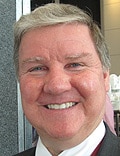MIAMI — Noninvasive neuromodulation with external trigeminal nerve stimulation (eTNS) may be a useful adjunctive treatment for patients with major depressive disorder (MDD) that is not adequately controlled by antidepressant medication, new research suggests.
Compared with sham treatment, active eTNS produced significantly greater reductions in depression severity in this small study of 43 adults with MDD.
The study was presented here at the American Society of Clinical Psychopharmacology (ASPC) 2015 Annual Meeting.
"We initially began working on trigeminal nerve stimulation for drug-resistant epilepsy and have now started looking at its efficacy in psychiatric disorders like depression, PTSD, and ADHD," Ian A. Cook, MD, from NeuroSigma, Inc, and the University of California, Los Angeles, told Medscape Medical News.

Dr Ian Cook
"PET imaging studies have shown that when the device is turned on, there occurs a rapid and robust change in blood flow in limbic and frontal regions of the brain and a decrease in activity in other areas of the brain that we think are important for seizure suppression. The effect is rapid," Dr Cook said.
Rapid Effect
The current study included 43 adults aged 23 to 65 years with nonpsychotic unipolar MDD who were unresponsive to more than 6 weeks of treatment with at least one antidepressant.
Participants were randomly assigned to receive active stimulation or control sham stimulation for 6 weeks. They self-stimulated the trigeminal nerve for 8 hours each night at home using patch electrodes placed on the forehead.
"They used the device mostly while they slept. There's no zapping of the brain; in fact, we have data to suggest that there is no current leaking through the skull into the brain, so it's not a mini ECT, if you will. People often describe that the sensation when the device is there is like a tingling or buzzing sort of vibrational feeling in their forehead. It often seems to help with sleep, and patients say they fall asleep pretty rapidly with the device," Dr Cook said.
Clinical outcomes were assessed using the Beck Depression Inventory (BDI), the Inventory of Depressive Symptomology (IDS-SR), and the Hamilton Depression Rating Scale (HDRS-17).
The patients continued to take their medications throughout the study period.
Patients receiving active stimulation had significantly greater symptom improvement at week 6 than patients receiving the control condition on the BDI, and they approached significance on the IDS-SR.
Table. Symptom Improvement With TNS vs Sham
| Rating | TNS | Sham | P-value |
| BDI | -41.7% | -10.9% | 0.013 |
| IDS-SR | -30.3% | -2.5% | 0.060 |
| HDRS-17 | -36.8% | -30.5% | n.s. |
Symptom severity also improved significantly for patients receiving active stimulation.
The mean standard deviation (SD) score on the BDI fell from 24.6 (SD, 8.5) at baseline to 14.2 (SD, 7.3) at week 6 (P < .00001; the mean score on the IDS-SR fell from 38.3 (SD, 10.2) to 26.1 (SD, 10.5; P < .00001), and the HDRS-17 score fell from 19.4 (SD, 4.5) to 12.1 (SD, 6.4; P < .0001).
"The trigeminal nerve is very important in the evolutionary sense," Dr Cook said. "Small foraging animals sense their environment through their whiskers, which is the trigeminal nerve in these animals. And we know from other data that there is a rich network of centers in the brain that are fed information through this pathway."
TNS is still investigational in the United States, but it has CE Mark approval in Europe and Health Canada approval for use in depression, Dr Cook said.
An Intriguing Concept, but….
"This is an intriguing concept and potentially promising lead," Alan J. Gelenberg, MD, professor emeritus at the University of Arizona, in Tucson, and editor-in-chief of the Journal of Clinical Psychiatry, told Medscape Medical News.

Dr Alan Gelenberg
"But this technique and the data supporting it are still very preliminary. It will take a long and expensive process to rigorously assess whether it is, in fact, a safe and effective treatment for depressed people," Dr Gelenberg said.
Dr Cook reports having financial relationships during the past 5 years with Allergan, Aspect Medical Systems/Coviden, Cyberonics, Eli Lilly and Company, the National Institutes of Health, NeoSync, Neuronetics, NeuroSigma, the US Department of Defense, and US Department of Justice, and the US Veterans Administration. He is an employee of NeuroSigma. Dr Gelenberg reports no relevant financial relationships.
American Society of Clinical Psychopharmacology (ASPC) 2015 Annual Meeting.
Medscape Medical News © 2015 WebMD, LLC
Send comments and news tips to news@medscape.net.
Cite this: TNS May Improve Symptoms of Major Depression - Medscape - Jul 09, 2015.







Comments